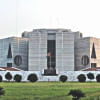More relatives can now be donors
Parliament last night passed the “Transplantation of Human Organs Bill, 2018,” expanding the definition of close relationships to include cousins, grandparents and grandchildren.
This may make organ transplantation a little easier.
The new definition includes parents, children, brothers and sisters, husbands and wives as well as blood-related grandparents, grandchildren, cousins, maternal and paternal uncles, and aunts.
Under the current law, “close relationships” is used to refer to only son, daughter, father, mother, brother, sister, paternal and maternal uncle and aunt, husband and wife.
Only those who fall under the definition can act as donors.
Health Minister Mohammed Nasim placed the bill before the House.
The House, with Speaker Shirin Sharmin Chaudhury in the chair, passed the bill by voice votes, rejecting the amendment motions put forward by the opposition lawmakers.
While placing the bill, Nasim said the law is aimed at improving the country's healthcare services maintaining consistency with the advancement of medical science.
The proposed bill will make the existing law of 1999 more attuned with the current time and once the law is implemented, it will help check trafficking of human organs and their illegal trade, he said.
Data from 2016 showed that some 30,000 people die in Bangladesh failing to have kidney transplants or dialysis and some 40,000 become end-stage kidney patients.
“Lives of at least 20,000 could have been saved had their kidneys been transplanted,” Kidney Foundation President Prof Harun Ur Rashid had said at the time.
With the new definition of “close relationships”, more people will be able to find donors soon.
Previously, many patients would opt to go abroad to countries like India for transplants, where non-relatives can donate kidneys. But the cost is much higher than if the procedure is done in Bangladesh.
There have also been cases where people would forge documents to prove close relations with donors to expedite the transplantation. Under the new law, if anyone is found guilty of doing so or is either encouraged or intimidated to do so, it will constitute a crime. The culprit will be sentenced to minimum two years' of rigorous imprisonment or have to give a fine of Tk five lakhs or both.
The bill also stipulates that any organ transplantable to the human body, including the kidney, liver, bones, eyes, heart, lung and tissues, could be transplanted from human bodies having heartbeats or from those on life support only.
Furthermore, under the new bill, no hospital in the country can conduct human organ transplant without the government's approval while public hospitals with specialised units can do the task without taking prior approval.
If any hospital wants to carry out such transplants, it can apply to the government after meeting some specified conditions, the bill says.
The government may allow hospitals to conduct the operation if the requirements are met.
Hospitals have to apply to the authorities concerned within 60 days of enactment of the law.
The government may revoke the licences of hospitals if the law is violated.
The bill mentions that there will be a medical board in every hospital for deciding the transplantation and a National Cadaveric Committee to oversee the human organ transplants in the country.
In the name of organ donation, illegal trade of organs has reportedly been going on in the country for over a decade.
Wealthy recipients and brokers trick poor and illiterate people into selling their organs by making false promises of high prices, jobs and a chance to go to foreign countries.
The new bill also comes with a provision of minimum three years of rigorous imprisonment or Tk 10 lakhs fine or both for violation of the law in a bid to check organ trafficking.
The existing law stipulates imprisonment for a minimum of three years to a maximum of seven years, and/or penalties of a minimum fine of Tk three lakhs.
Any doctor convicted under the law will lose his or her registration with Bangladesh Medical and Dental Council.
A three-member coordination committee will be formed in every hospital comprising a neurologist, an anaesthesiologist and a medicine or critical medicine specialist and they will have to be professors or at least associate professors.
As per the new proposed law, a National Cadaveric Committee will be constituted with the vice chancellor of Bangabandhu Sheikh Mujib Medical University (BSMMU) as its chairman to oversee the human organ transplantation, visit transplantation facilities as well advise the government regarding human organ transplantation.
Besides, there will be a four-member certification board headed by a director of the Health Directorate and no organ transplantation will be allowed in any hospital of the country without approval from the board.
There will also be a three-member medical board in every hospital for deciding the transplantation of the organs with a professor of the Department of Surgery as its chief. The board could also co-opt one or more such expert physicians as its members if necessary.

 For all latest news, follow The Daily Star's Google News channel.
For all latest news, follow The Daily Star's Google News channel. 







Comments